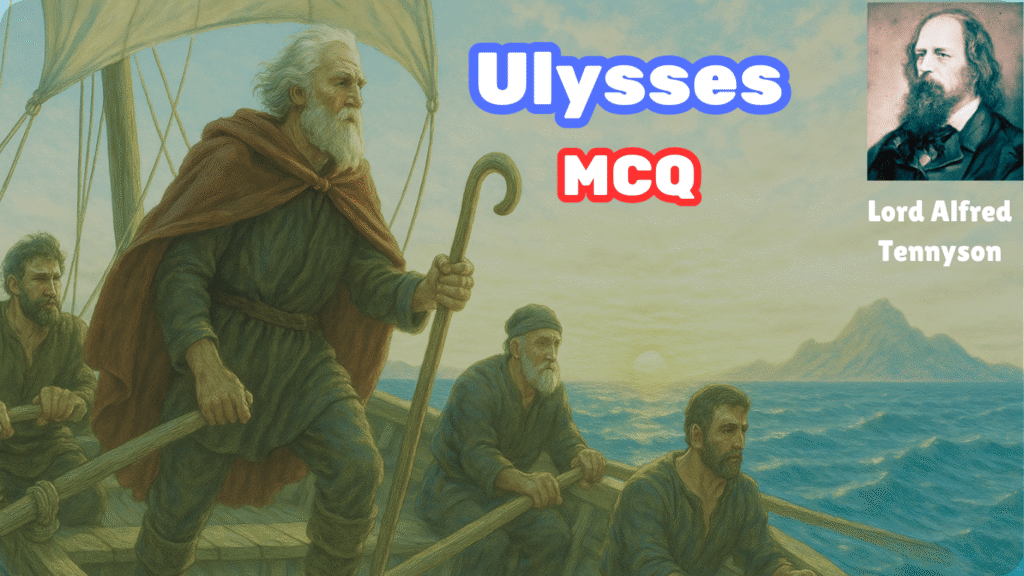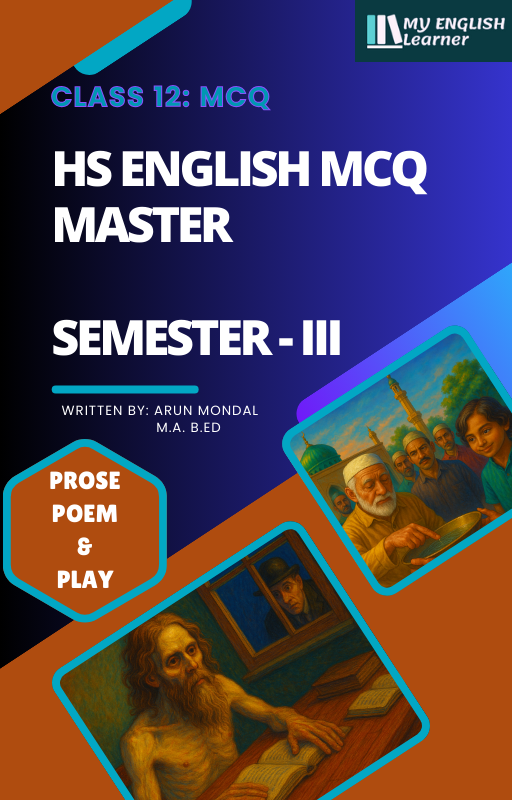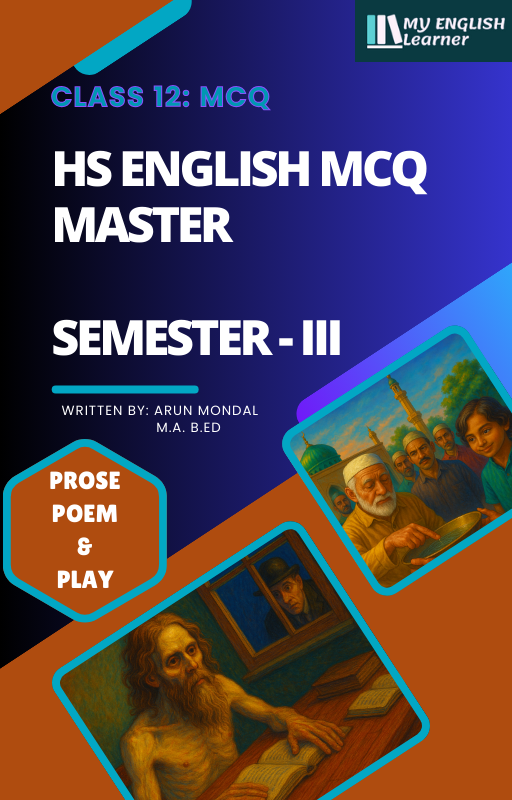
1) What mythological figure is Ulysses based on?
A) Aeneas
B) Achilles
C) Odysseus
D) Hector
Answer: C) Odysseus
2) ‘Ulysses’ by Lord Tennyson is –
A) a sonnet
B) a dramatic monologue
C) an elegy
D) a lyric
Answer: B) a dramatic monologue
3) The poem ‘Ulysses’ was published in—
A) 1833
B) 1842
C) 1850
D) 1857
Answer: B) 1842
4) “It little profits that an idle king” – Who is the ‘idle king’ referred to in this line?
A) Hyades
B) Ulysses
C) Telemachus
D) Achilles
Answer: B) Ulysses
5) “Match’d with an aged wife” – In this line Ulysses implies-
A) He regrets his marriage
B) He and his wife are equal
C) He finds life dull and stagnant
D) He loves his wife deeply
Answer: C) He finds life dull and stagnant
6) “I mete and dole unequal laws unto a savage race” – What does “mete and dole” mean?
A) Conquer and divide
B) Measure and give out
C) Eat and drink
D) Write and read
Answer: B) Measure and give out
7) What does Ulysses say about his people?
A) They are warlike and noble
B) They are savage and uncivilised
C) They are a “savage race” who hoard and sleep
D) They are wise and energetic
Answer: C) They are a “savage race” who hoard and sleep
8) What was the homeland of Ulysses?
A) Troy
B) London
C) Ithaca
D) Rome
Answer: C) Ithaca
9) What is Ulysses’ main complaint in the poem?
A) His wealth is insufficient
B) His subjects are disloyal
C) Life at home is dull and inactive
D) His son is disobedient
Answer: C) Life at home is dull and inactive
10) Why didn’t Ulysses want to settle in his homeland?
A) he hated his homeland
B) he hated his aged wife
C) he hated his subjects
D) he wanted to explore the world
Answer: D) he wanted to explore the world

11) Ulysses describes his subjects as –
A) ‘Free hearts, free foreheads’
B) a ‘savage race’
C) ‘most blameless’
D) ‘a bringer of new things’
Answer: B) a ‘savage race’
12) “I cannot rest from travel “—what does this line suggest about Ulysses?
A) He is sick
B) He is always energetic
C) He longs for constant adventure
D) He dislikes the sea
Answer: C) He longs for constant adventure
13) “I will drink life to the lees:” What does Ulysses want to say by this line?
A) He drinks wine
B) He wants to enjoy life to the fullest
C) He gives up drinking
D) He regrets past indulgence
Answer: B) He wants to enjoy life to the fullest
14) “I cannot rest from travel: I will drink life to the lees:” The figure of speech used here is –
A) Simile
B) Metaphor
C) Personification
D) Alliteration
Answer: B) Metaphor
15) “The rainy Hyades vext the dim sea” – What does “rainy Hyades” refer to?
A) A mountain
B) A storm
C) A group of stars
D) A season
Answer: C) A group of stars
16) What does the Hyades do when Ulysses voyages through the sea?
A) drinks life to lees
B) vexes the sea
C) subdues them
D) suffers them
Answer: B) vexes the sea
17) “I become a name” – What does Ulysses mean to say?
A) he becomes famous
B) he becomes notorious
C) he becomes anonymous
D) None of these
Answer: A) he becomes famous
18) “And drunk delight of battle with my peers” – Here, the ‘peers’ are –
A) subjects of Ulysses
B) mariners of Ulysses
C) enemies of Ulysses
D) soldiers of Ulysses
Answer: B) mariners of Ulysses
19) “Far on the ringing plains of windy Troy.” – What does the phrase ‘ringing plains’ signify?
A) clamour of arms on the battlefield
B) sound of trumpets on the battlefield
C) noise of the battle cry on the battlefield
D) all of these
Answer: A) clamour of arms on the battlefield
20) “Yet all experience is an arch wheretro’/Gleams that untravell’d world…” The figure of speech used in this is –
A) simile
B) metaphor
C) climax
D) personification
Answer: B) metaphor
21) “To rust unburnish’d, not to shine in use!” – What does the term “unburnish’d” imply about Ulysses?
A) He is tired
B) He is lazy
C) He is unused and idle
D) He is old
Answer: C) He is unused and idle
22) “Life piled on life/Were all too little” – What does Ulysses suggest here?
A) Life is short
B) to enjoy everything within the short span of life
C) Many lives cannot satisfy his hunger for knowledge
D) all of these
Answer: C) Many lives cannot satisfy his hunger for knowledge
23) “From that eternal silence, something more,/A bringer of new things”- What does the ‘eternal silence’ signify?
A) life
B) death
C) knowledge
D) adventure
Answer: B) death
24) How many years will Ulysses stay in his kingdom?
A) a year
B) 2 years
C) 3 years
D) many years
Answer: C) 3 years
25) “This gray spirit yearning in desire”—what does the ‘gray spirit’ of Ulysses signify here?
A) spirit full of buoyancy
B) declining spirit
C) old age
D) none of these
Answer: B) declining spirit
26) Ulysses wanted to hand over the kingdom to –
A) Telemachus
B) Achilles
C) One of his mariners
D) The people
Answer: A) Telemachus
27) Who was Telemachus?
A) friend
B) subject
C) mariner
D) son
Answer: D) son
28) “This is my son, mine own Telemachus,/To whom I leave the sceptre and the isle,” –What does the ‘sceptre’ symbolise?
A) royal authority
B) adventurous spirit
C) a magical weapon
D) none of the above
Answer: A) royal authority
29) How did Telemachus contrast with his father?
A) Adventurous and reckless
B) Practical and dutiful
C) Heroic and tragic
D) Lazy and indifferent
Answer: B) Practical and dutiful
30) Who will subdue the rugged people of Ithaca after Ulysses?
A) Achilles
B) Telemachus
C) Patroclus
D) Ajax the Great
Answer: B) Telemachus
31) How could Telemachus make the rugged people of Ithaka gentle?
A) by his common duties
B) praying to household gods
C) through his soft manner
D) performing his common duties
Answer: C) through his soft manner
32) Telemachus pays homage to his –
A) parents
B) Gurus
C) household gods
D) elders
Answer: C) household gods
33) The line “He works his work, I mine” shows—
A) Mutual respect
B) Jealousy
C) Love
D) Hatred
Answer: A) Mutual respect
34) “There lies the port; the vessel puffs her sail:” – What does the ‘vessel’ refer to?
A) a person
B) the ship
C) a mariner
D) Penelope
Answer: B) the ship
35) What does Ulysses ask his mariners to do?
A) Stay home
B) Guard Ithaca
C) Sail with him again
D) Train new sailors
Answer: C) Sail with him again
36) What does the phrase ‘the thunder and the sunshine’ signify?
A) natural phenomenon
B) both bad and good times
C) hindrances created by god
D) all of these
Answer: B) both bad and good times
37) “T’ is not too late to seek a newer world” The line conveys—
A) Certainty
B) Doubt
C) Hope
D) Despair
Answer: C) Hope
38) “…sitting well in order smite /The sounding furrows” – What does the phrase “The sounding furrows” refer to?
A) deadly thunder
B) violent storm
C) waves in the sea
D) echoing valleys
Answer: C) waves in the sea
39) “Made weak by time and fate, but strong in will”—What does the line show about the will of Ulysses?
A) Helplessness
B) Determination despite ageing
C) Sacrifice of his life
D) Yearning for a voyage
Answer: B) Determination despite ageing
40) “To strive, to seek, to find, and not to yield”— This ending line of the poem shows ______of Ulysses.
A) Frustration
B) Resolution
C) Sadness
D) Rejection
Answer: B) Resolution
41) “To strive, to seek, to find, and not to yield”—what literary device is used here?
A) Irony
B) Repetition
C) Simile
D) Rhyme
Answer: B) Repetition

Read more about:
The Night Train at Deoli – MCQ